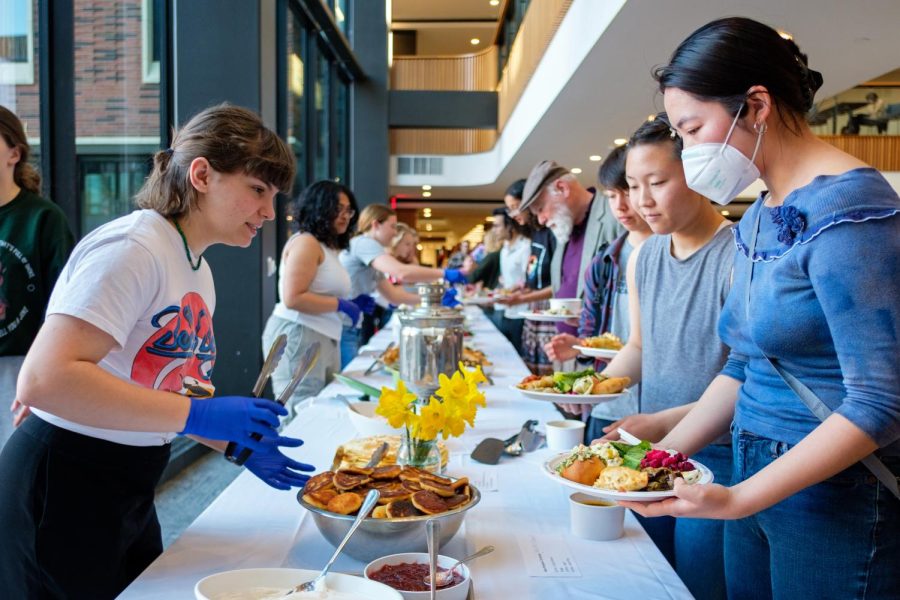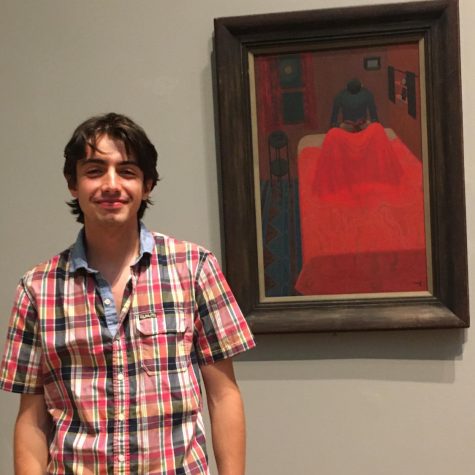Slavic Coffeehouse returns to celebrate spring
Organizers prepared over 15 dishes of Russian, Central European and Eurasian origin.
April 14, 2023
Grinnell College students, faculty and community members gathered Saturday evening, April 8, in the Humanities and Social Sciences Center (HSSC) atrium for this year’s Slavic Coffeehouse, an annual event organized and hosted by the Russian Department, Russian, Central, and Eastern European Studies concentrators and students affiliated with the region.
The tradition dates back to at least the early 1990s, according to Todd Armstrong, professor and department chair of Russian at the College. Named after a space called the coffeehouse in the Forum where it was first celebrated, Slavic Coffeehouse originally took place over the course of three days during which students and faculty members prepared and served various dishes from Slavic and Russian cuisines.
At some point, Armstrong said, it merged with the celebration of Maslenitsa: a folk holiday celebrated before Lent primarily in Belarus, Ukraine and Russia which traces its roots to pre-Christian religion. One such custom of Maslenitsa in particular features prominently in Grinnell every spring: the burning of a wooden effigy that represents the end of winter.
“Food is an area that I really think provides an important window into a culture,” Armstrong said, who takes an active role organizing the event each year. “Slavic Coffeehouse becomes a sort of forum for students to show something about their culture through food. Different dishes have emerged as favorites over the years and students seem to really have a lot of fun participating.”
Due to the COVID-19 pandemic, Slavic Coffeehouse was not celebrated in 2021 and not open to the public in 2022, so this year marks its first full celebration since the spring of 2020, immediately before Grinnell students were first sent home.
“I’ve worked the event since my first year,” said Khondamir Imomnazarov `23, who is from Uzbekistan and a member of Grinnell’s Russian-speaking community. “This was the first time in years that it happened as it should and was able to gather all of campus together. I would say that this year Slavic Coffeehouse returned in its full glory,” he added.
During the event, every table in the HSSC atrium was full and a long line formed as attendees awaited dishes including syrniki, plov and pierogis. According to Armstrong and Imomnazarov, cooking and serving such a meal required a vast amount of work. Likewise, the Russian Student Educational Policy Committee, other Russian language learners and community members, alongside Armstrong and Global Kitchen Culinary Coordinator David Stanley, planned the details of the event before spending several days preparing all the food.
“It was really a collaborative effort,” Imomnazarov said. “We used multiple kitchens all over campus. For two days people were always on the clock in shifts, changing one after another. Overall it was an incredible amount of effort on the part of the students involved,” he continued.
Though its aim — using food as a way to celebrate and educate about Slavic, Russian, Eastern European and Central Asian cultures — remains unchanged, Russia’s recent invasion of Ukraine has added new dimensions and significance to Grinnell’s annual celebration, Armstrong said.
“It makes us think more carefully about how we talk about Russian and Russian language speakers,” he said. “We’re trying to support all the students who speak Russian in a respectful way, and the importance here too is to recognize that the language doesn’t belong to Putin. Russian culture is incredibly rich and valuable in its own right.”
Armstrong finds that food can be a crucial lens in which to view the current political reality. He used borscht as an example, relating how he had for most of his life associated the red beetroot soup with Russian cuisine before more recently learning of its Ukrainian origins. “Just through this one dish I’m able to observe different aspects of identity, of conflict, of historical narratives of colonization, and the need to rethink how we teach Russian culture,” he said.
Imomnazarov said that he views Slavic Coffeehouse as a way to strengthen community-bonding in Grinnell in spite of Russia’s invasion of Ukraine.
“It really is about bringing all of us together—all of us who have ties to the region—celebrating something that unites us from before the war, before even the Soviet Union or the Russian Empire existed. The holiday Maslenitsa is ancient, from a time when there were no nation states to speak of, so I think it’s super significant for that regional dynamic, but the way we do it in Grinnell also celebrates the rest of the post-Soviet space too,” he said.
Looking ahead, Imomnazarov said that he hopes future Slavic Coffeehouses can further educate people about the cultural significance of the event beyond just eating food. Meanwhile, Armstrong said that he would like to add a dimension of fundraising for local food insecurity.
“Here we all are enjoying this amazing feast and yet there are people going hungry in Poweshiek County,” he said. “How is that possible? Whenever we’re eating, we have to always think about those who have not. I think that’s just an underlying ethical demand. Feeding people offers a way to engage and somehow make the world a better place.”
















































